Ricardo Orellana grew up against the backdrop of a 12-year civil war in his native El Salvador, but his childhood memories are thankfully dominated by more peaceful recollections — namely, of working with the cows at his grandmother’s farm outside the small town of Usulutá.
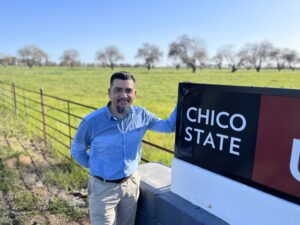
“It wasn’t a large farm, just five or six acres with about 25 milking cows and a few other animals,” Orellana said during a recent interview. “She also grew cassavas, tomatoes, beans and corn. It was very rural, and how I fell in love with agriculture.”
In the ensuing decades, that passion has carried Orellana around the world, and most recently to Chico. Orellana was hired as the director of the Chico State University Farm last year, and this month will celebrate one year serving in that capacity. He is the first person of color and the first native Spanish speaker to hold that job, and brings a unique international perspective to the position.
Orellana was educated first at Zamarano University in Honduras, achieved his doctorate in plant and soil sciences from the University of Massachusetts, Amherst, and also holds degrees from universities in Chile and El Salvador. He has lived and worked all over Central and South America and in more far-flung locations, including a short stint in Egypt.
Much of his previous work was focused on helping under-served populations. He comes to Chico State from Cornell University, where he organized food safety training for Latino communities in North and South America. In Egypt, he sought better pay and working conditions for women, who provide the backbone of that country’s booming sun-dried tomato industry.
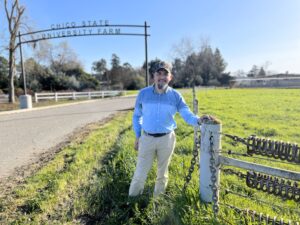
“Ricardo is quickly learning Northern California agriculture and already knows a lot about global agriculture,” said David Hassenzahl, dean of California State University Chico’s College of Natural Sciences, who is currently doing double duty as the interim dean of the school’s agriculture department.
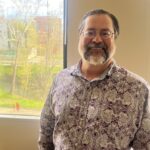
“He’s very qualified and doing a great job, and comes with a lot of experience in ag extension, which is how universities share their agricultural knowledge with the community. He’s very experienced in working with communities and raising a variety of crops.”
Orellana maintains an office in the administrative building, where he outlined his duties as director of the 800-acre farm and shared his history and plans for the future with ChicoSol.
Tradition versus progress
One of the primary issues in agriculture for the last two decades, and one that certainly plays into ag education, is the use of traditional methods versus more progressive practices focused on organic, regenerative and sustainable farming. Orellana said in order to best prepare students, the farm offers instruction across the board.
“I understand the importance of both,” he said. “Conventional ag exists for so many reasons, and organic and regenerative ag exists because we have some problems managing resources. Our goal is to serve the industry so people can come here and see what’s going on.
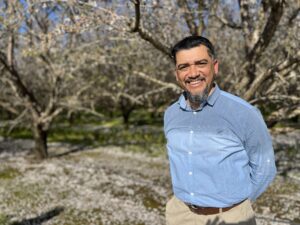
“What is the best … I think that’s not my business,” he continued. “People do things for a reason, and we need to expose students to all different types of practices and management, so they can find what they want to do and the niche they want to work in.”
That said, Orellana said the best way to bolster emerging methods is with data and research, another of the farm’s endeavors. “This is not a specialized place doing only research, and I don’t see us competing with those big institutions that do that because we don’t have the resources or the specialization.
“But I do see us doing practical research for the people we serve. Then you can ask, ‘What is good and what is bad?’, you have the data, and then you can provide opinions on that.”
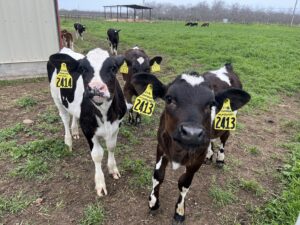
One such research project taking place at the farm, now in its first of five years, is a carbon sequestration project being conducted by Chico State’s Center for Regenerative Agriculture and Resilient Systems. Two fields of alfalfa have been planted side by side, one of which will be tended with traditional methods and the other with newer methods, and data will reflect how much carbon is deposited into the soil and other factors.
Another project promoting and teaching students more sustainable practices is the Organic Vegetable Project, a 3-acre piece of land producing more than four dozen varieties of organic-certified vegetables. It was founded in 2008, and Scott Grist has served as director of the project since summer 2019. Grist said the OVP is “where some of the most revolutionary things are happening at the farm,” and noted it is the only unit dedicated entirely to organic plant production. Vegetables grown there are distributed to students in need, for free, at the Hungry Wildcat Food Pantry, and served in campus dining halls.
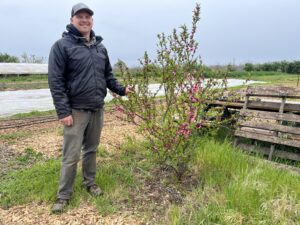
“Ricardo has been super supportive of new, sustainable ideas, and of coming up with new and innovative ways of thinking about and managing the farm in general,” Grist said, explaining that he’s been working with Orellana to ensure funding to sustain the OVP into the future.
“He’s not boxed in by the past and he’s able to see how things can be rearranged to improve the efficiency of each unit without being afraid of the outcome. Politics and ideologies can sometimes get in the way of making changes, but he’s not afraid to take those risks.”
During the conversation, Orellana also touched on international agricultural issues ranging from labor and distribution of wealth (“In some instances, the people working to produce the food others enjoy do not even have the money to eat that food themselves”) to water issues. He shared his own experiences living and working in El Chaco in Paraguay, where people are rationed 65 liters of water a month — less than a gallon a day (“Climate change is real, and even places like the North State where water is plentiful now, people need to prepare”).
“Everything ties together, everything has an influence, and politics do as well, because sometimes politicians make decisions that are not well-informed. They need to ask questions so those decisions can better represent the interests of all people.
“All of the students we have in our classes, they will be the next ranchers, farmers, owners of companies, and representatives … and that’s why all of this is so important.”
A living laboratory
The University Farm, formally known as the Paul L. Byrne Memorial University Farm, is located off Hegan Lane, south of Chico. It was established in 1960 to provide hands-on experience for Chico State’s agriculture and natural science students. The farm includes an organic dairy; several fruit and nut orchards; row crops; separate animal units dedicated to sheep, beef and swine; a USDA-monitored Meats Laboratory; and the aforementioned Organic Vegetable Project. There are also classrooms, though much of the instruction takes place in the open air. The farm serves an estimated 250 students daily. Orellana’s predecessor, Dave Daley, served as the farm’s director for 13 years.
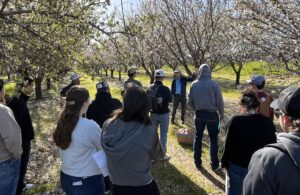
Orellana explained that managing a university farm is quite different than working at any other agricultural center.
“Most farms are strictly commercial, and for that reason they are driven by what the market wants,” he said. “This is a lot different, in that we need to produce what the students need and the community wants and bring them here. We have to plan, budget, and define key performance indicators for every activity, then monitor and report them. And what we do needs to relate to the curriculum and benefit the students.
“We have a lot of stakeholders that the farm serves and must answer to … students, the university authorities, and the local community. My challenge is to do this and keep the farm sustainable.”
It’s a delicate balancing act. Animal and crop units must be profitable, to some degree, in order to augment what is budgeted by the university for operating costs, improvements, student labor and other expenses.
“A few crops need to make money to survive,” he said. “And even if some lose money, we need to know we’re training students and doing research, keeping up with industry interest, and making sure that students learn what they need to get a job.
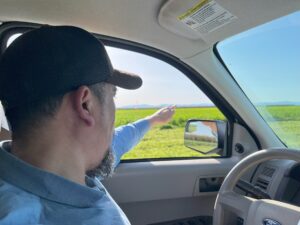
One of his most pressing tasks since taking the job has been creating a plan to upgrade the facilities using a one-time $18.75 million granted to each of the California State University system’s four farms in its 2022-23 budget (the others are located at Fresno State, Cal Poly Pomona and Cal Poly San Luis Obispo). More than half of that funding will go toward a new, 10,000-square foot Agricultural Teaching and Resource Center building that will serve as a conference center and house new classrooms, a farm store, commercial kitchen and offices. A groundbreaking ceremony will be held later this summer, and Hassenzahl said the construction is scheduled to be completed in summer 2025.
The funding will be also be used to upgrade infrastructure and to replace some of the farm’s aging machinery; Orellana noted that some of the existing tractors and other equipment have been in use for decades and are badly in need of being replaced.
“Ideally, we could have the farm open from July to September with lots of crops that people can come pick” — Ricardo Orellana
Among Orellana’s top goals is ensuring that the farm attracts and engages the entire community, which he believes the new building will help accomplish by providing an attractive space for university — and even public — events. He mentioned the popularity of the farm’s “U-Pick Peaches” event held in August, when people can come pick that fruit for a nominal price, and said he’d like to expand on that to offer other fruits like plums, pears and mandarin oranges.
“Ideally, we could have the farm open from July to September with lots of crops that people can come pick,” he said. “It would increase the food production, and bringing the community in is important even if we don’t make a lot of money from it.”
“Professional development is important for people working and studying here. We want to make sure that when they open their eyes in the morning they want to come here, that it’s an environment that invites them to grow, to have friends and a good life here.”
Ken Smith is a freelance writer and editor based in Chico who produced this story and the video and photos.
After ChicoSol was informed of a change in the university’s plans, this story was corrected (on April 10) to state that the groundbreaking ceremony for the Agricultural Teaching and Resource Center will be held later this summer.
